- Jeff Lazarto
- Reading Time: 4 minutes
 If you are like most companies who have been running SAP for some time, each year around Thanksgiving you receive your SAP support renewal invoice for the upcoming year and shake your head at the amount of fees compared to the perceived value received. Perhaps it has reached the point where you decide to call SAP to negotiate a lower price, or ask that at the very least, SAP remove your unused licenses from the support fee calculation. Inevitably, after some back and forth and a long song and dance, the answer from SAP is some form of no.
If you are like most companies who have been running SAP for some time, each year around Thanksgiving you receive your SAP support renewal invoice for the upcoming year and shake your head at the amount of fees compared to the perceived value received. Perhaps it has reached the point where you decide to call SAP to negotiate a lower price, or ask that at the very least, SAP remove your unused licenses from the support fee calculation. Inevitably, after some back and forth and a long song and dance, the answer from SAP is some form of no.
The good news is that if you are serious about reducing your SAP support fees for 2016, there is a path to gain leverage and get executives within your company fired up for those negotiations. The best time to begin the process is now, and at the very least no later than Labor Day. As the great UCLA basketball coach John Wooden would say, “Failing to prepare is preparing to fail.” So let’s discuss a plan of attack.
The key to manufacturing leverage is to have options, which in this case means looking at third party support. Many of you are probably aware that third party support providers will cut your support fees in half for signing up with them. But there are challenges associated with considering a move to third party support that need to be navigated before it can become a viable option.
- Determine if third party support can meet your company’s SAP support requirements.
- Get a feel of the cultural fit within your company. “Will the third party support provider be able to work well with my company in delivering the service?”
- Get a definitive picture of the commercial terms and pricing details.
Answering these questions requires conducting a full evaluation of the third party support providers specific to your company’s requirements. In some cases they may provide far superior service compared to what you currently receive from SAP; in other instances it may be slightly different but of equal value; or it may be that it is not a viable option. But the key here is to conduct the evaluation to know for sure, rather than making sweeping generalizations or getting discouraged by the internal hoops you need to jump through to get executive level buy-in.
Conducting the evaluation allows you to obtain facts on capabilities, cultural fit, and commercial terms. If the facts are compelling enough to demonstrate greater value at substantial cost savings, then the executives will buy-in. After all, who doesn’t want to get credit for adding value and saving the company money at the same time?
But the evaluation process takes time, which is why it is critical to begin prior to Labor Day. Every company will have their own unique issues and concerns, but here are 6 key considerations in evaluating third party support:
6 Key Considerations in Evaluating Third Party Support
1.Current SAP Support Utilization – what exactly do you receive today for your support fees?
2. SAP Support Maturity – are your SAP applications mature and stable or cutting edge with SAP still investing heavily in functionality improvements? Is your company a mature SAP user that knows how to run and manage your system or do you rely on SAP for lots of training and handholding?
3. Anticipated Support Requirements – are you relying on upcoming upgrades to solve critical issues? Does your company have a history of typically deploying upgrades as they are released or are you running older versions? Do you have customizations that are unsupported by SAP under current Enterprise Support policies?
4. Third party support capabilities – do they have the expertise and experience to meet your support requirements, including support of any customizations that are unsupported by SAP?
5. SAP Relationship – does your company have strong ties with SAP executives that your executives are fearful of straining? Are there any near-term license purchases on the horizon that could be negatively impacted by switching support providers? Are there concerns that an audit may reveal non-compliance scenarios resulting in substantial fees?
6. Cost / Value Equation – What is the delta between the cost/value of third party support compared to what you are currently receiving from SAP today?
Oh, and there are scenarios where moving to third party support can cut your support fees by greater than 50%; which is something we are willing to discuss on an individual basis.
And here is the fun part; you now have a great negotiating platform for approaching SAP – assuming your company would still be open to remaining on SAP support – but at a lower cost more aligned to the actual value your company receives.
Allocating a couple of months to complete a full and comprehensive evaluation would put your company in a position to prepare for SAP negotiations in the early part of Q4. Since you would ideally want some time to ramp up third party support prior to January 1, this gives you a few weeks to a month to conduct a high pressure negotiation with SAP, where you have all the leverage. SAP does not like being on the receiving end of pressure, but they do like using high pressure and time sensitive sales tactics to drive you to make purchases by SAP’s quarter end to meet their company goals. Now you have the ability to flip the script to meet your company’s goals for a change, and put a time pressure offer on SAP to either agree to lower their support fees or risk losing your support fees altogether.
Obviously there are many scenarios that can be played out here and third party support may or may not be a viable option for your company. But the key is that right now you have the ability to make a factual determination without alerting SAP or risking damage to your relationship, and thereby availing your company with options, knowledge, and leverage for negotiating your upcoming support renewal. It sure beats the alternative of groveling to SAP at the last minute in December asking for a support fee reduction, with both of you knowing that if they say no, you will go ahead and sign-up for SAP support anyway.
The above scenario and considerations also apply to support from many of your other enterprise software providers.
We would love to receive your feedback and thoughts so please do not hesitate to post a comment. You may also contact me directly at jlazarto@upperedge.com if you would prefer a more discrete discussion regarding your specific circumstances.
Related Blogs
Key Levers SAP is Pulling to Compel RISE and AI Adoption
Where SAP Missed the Mark at Sapphire 2024
Questions to Ask About SAP’s RISE and AI Strategy
About the Author
